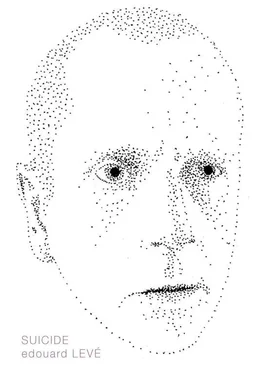Édouard Levé - Suicide
Здесь есть возможность читать онлайн «Édouard Levé - Suicide» весь текст электронной книги совершенно бесплатно (целиком полную версию без сокращений). В некоторых случаях можно слушать аудио, скачать через торрент в формате fb2 и присутствует краткое содержание. Город: Lonton, Год выпуска: 2011, ISBN: 2011, Издательство: Dalkey Archive Press, Жанр: Современная проза, на английском языке. Описание произведения, (предисловие) а так же отзывы посетителей доступны на портале библиотеки ЛибКат.
- Название:Suicide
- Автор:
- Издательство:Dalkey Archive Press
- Жанр:
- Год:2011
- Город:Lonton
- ISBN:978-1-56478-628-9
- Рейтинг книги:3 / 5. Голосов: 1
-
Избранное:Добавить в избранное
- Отзывы:
-
Ваша оценка:
- 60
- 1
- 2
- 3
- 4
- 5
Suicide: краткое содержание, описание и аннотация
Предлагаем к чтению аннотацию, описание, краткое содержание или предисловие (зависит от того, что написал сам автор книги «Suicide»). Если вы не нашли необходимую информацию о книге — напишите в комментариях, мы постараемся отыскать её.
, just a few days before he took his own life.
Suicide
Suicide
Suicide — читать онлайн бесплатно полную книгу (весь текст) целиком
Ниже представлен текст книги, разбитый по страницам. Система сохранения места последней прочитанной страницы, позволяет с удобством читать онлайн бесплатно книгу «Suicide», без необходимости каждый раз заново искать на чём Вы остановились. Поставьте закладку, и сможете в любой момент перейти на страницу, на которой закончили чтение.
Интервал:
Закладка:
You spoke little, but with precision, and with passion when speaking to someone you knew. You weren’t urbane. At a party, you wouldn’t head toward strangers to start up a conversation. You became acquainted with new people if they spoke to you. Though you knew how to speak with whomever you wanted, you preferred asking questions to making assertions. You could listen endlessly to someone answering your questions, or to several people speaking together on a subject that you had brought up. Not liking to speak about yourself in public, your questions allowed you to hide yourself behind the position of listener.
At night you perceived the flow of time less. Urbane duties were again put off until the next day. No social act needed to be undertaken; there was nothing to distract you from yourself any longer. You became contemplative without guilt, and without any limits beyond your fatigue.
Over the course of your sleepless nights, eyes closed, time did away with itself, thoughts and scenarios looped through your brain with the regularity of a clock. Like an adult looking at a merry-go-round designed for children, you observed the spinning of your reveries. They brought buried memories back to your consciousness, which disappeared the moment you recognized them and reappeared at the next turn before disappearing anew. You watched scenes unfurl, a passive spectator, as though at a film. By dint of being repeated, the actions you saw lost their meaning. You couldn’t have said how long each scene lasted, nor how long you spent watching them. You wouldn’t turn on the light in order to check the time, but when day broke through the shutters, you believed you hadn’t slept a moment since going to bed. Your wife affirmed to you, however, on waking, that she had heard you murmur incomprehensible phrases in your sleep. You had slept without perceiving it. You confused sleep with wakefulness.
You told me two of your dreams. In the first, you hold in your hand a pink card on which is written in red italics, The Eternal Roe-Deer . You understand the coded message; it is a wedding invitation from an old friend with whom you have been out of touch for the past ten years. The wedding takes place that very day in Finland. A helicopter sets you down above a fjord. Below, tables are set and assembled people greet you from afar as an important guest. You hear all their conversations distinctly and simultaneously, even though they are taking place three hundred meters down below. You look again at the invitation card, which is enough to transport you to the middle of the party, where all the women are your former lovers. At five o’clock, the parents of the newlyweds undress and dive into the fjord. The guests follow suit. The water has a taste of sweetened gooseberry and is breathable. In this ideal amniotic liquid, you make love with your former lovers, one after the other. They love each other as much as you love them.
In the second dream, you try to escape an armed man who is following you through an opera house over the course of a performance of Norma . You fight violently, starting up again several times, but neither of you gets the upper hand, except at the end of the performance, when your adversary manages to force you into a small room that hangs over the auditorium, and where “a very unusual man, who will be happy to meet you” is waiting for you. In this room there are computers and video screens. The man is mostly turned away from you, you don’t see his face. It’s not until you come closer, circling around him, that you discover, terrified, that it’s not a man, but an android robot of yellow chromed metal. It looks at you with cold eyes, shows you to your seat, and starts a video where you are seen on an operating table, confident, yawning as you fall asleep under the effects of the anesthetic. Surgical implements—in fact, instruments of torture—come down from box beams concealed in the ceiling. An articulated arm that has several needles on it reaches out toward your testicles, which a mechanical hand has just ligatured. You realize that, in the recent past, you’ve been kidnapped and operated upon without your knowledge.
You preferred the first dream, but the pleasure you felt having the one and the unease with which you dived into the other did nothing to alter the charm of recalling them. Dream or nightmare, what did it matter, if you could experience the confusion of reliving, while awake, the memory of things lived in sleep.
You left one day to walk along a beach in Normandy at low tide with your brother and sister. You were barefoot, in a bathing suit. The immense stretch of sand and water resembled a desert. It was during the week, in the off-season. There was nothing to do other than to walk, to look at the sea in the distance and the houses along the coast. While you remained silent and contemplative, your thoughts tossed here and there by the rhythm of your steps, your brother and your sister talked among themselves. They told each other funny stories, invented simple games, ran laughing, jumped in pools where they tried to catch shrimp and little fish with their hands. You didn’t join in their games. You thought of things unrelated to the setting in which you found yourself. This landscape was not, for you, a place to live, but a backdrop in which to float. You looked at your brother and sister; their bodies were alike, but you resembled neither. They were so happy together that they didn’t wonder why you were distant. You were their older brother, you had seen them be born and grow up. To be reminded of the differences that separated you gave you the impression of being a stranger to your family.
One July, when you were seventeen years old, you had dinner with some friends of your mother in the garden in front of the house. The table was set in front of the big open doors of the living room, on the old slabs of stone that marked the threshold of the vegetable garden. Among the six guests was a psychoanalyst, about fifty years old. You took it upon yourself to bring out the dishes that your mother had prepared. The kitchen was far away, you had to cross the old kitchen, the entrance, go along a hallway, and then pass through a small living room as well as the main living room in order finally to arrive at the table set in the place that you had chosen. You rarely dined there, your mother preferred the convenience of the dining room, and she was afraid of the cold when night fell. But you liked the view of the vegetable garden. The central path divided into three after about fifteen meters, and the side paths gave the garden the air of a nursery labyrinth. You had set down some candles on the table, in anticipation of evening. When it came, you lit them and they spread a soft light over the faces of the guests. The conversation was relaxed, you tasted the simple happiness of an agreeable meal in the company of intelligent adults. You participated in their exchanges, you were encouraged in your reasoning, which was thought to be quite daring for someone of your age. The psychoanalyst applied the following phrase to someone of whom you had spoken, who would endlessly apologize to justify the mistakes he made: “A self excused is a self accused.” When the time for dessert came, you went to the kitchen to look for the strawberry charlotte you had spent several hours making. You served the guests one by one, ending with yourself. You reflected on what the psychoanalyst had said and delayed tasting the dessert. The guests ate it slowly, in small spoonfuls, without saying anything. No one complimented you, as you would have expected them to do. You understood why after your first spoonful. The charlotte was salty. You then said: “But how could I have been such an idiot as to confuse sugar with salt?” The psychoanalyst retorted: “A self accused is a self excused.”
Читать дальшеИнтервал:
Закладка:
Похожие книги на «Suicide»
Представляем Вашему вниманию похожие книги на «Suicide» списком для выбора. Мы отобрали схожую по названию и смыслу литературу в надежде предоставить читателям больше вариантов отыскать новые, интересные, ещё непрочитанные произведения.
Обсуждение, отзывы о книге «Suicide» и просто собственные мнения читателей. Оставьте ваши комментарии, напишите, что Вы думаете о произведении, его смысле или главных героях. Укажите что конкретно понравилось, а что нет, и почему Вы так считаете.












